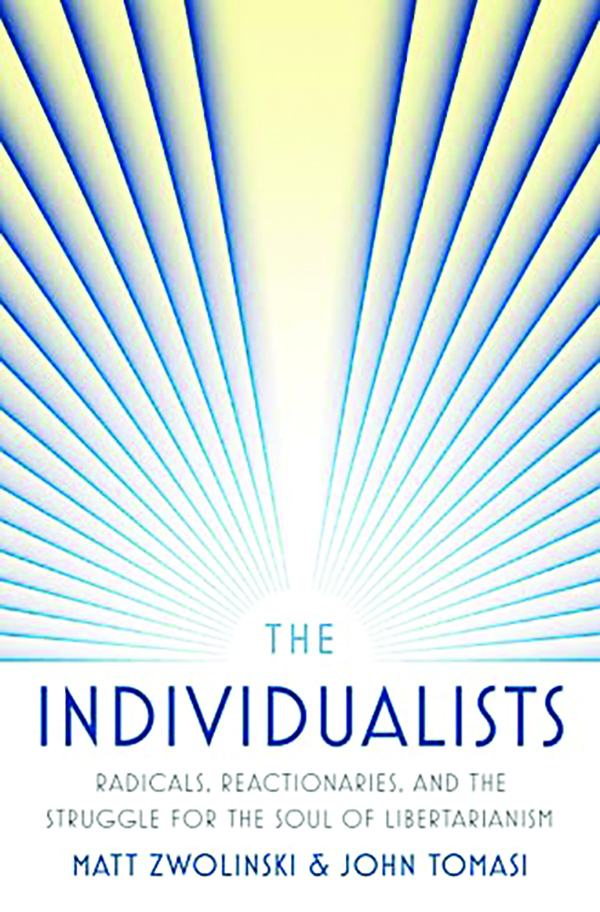
Illuminating the history of libertarianism
Jacob Grier
Libertarianism has always been an eccentric ideology. It has not always been an embarrassing one. In the not-too-distant past, to call oneself a libertarian might bring to mind figures such as Nobel Prize-winning economists Milton Friedman and Friedrich Hayek or philosopher novelist Ayn Rand. As recently as 2016, the Libertarian Party could boast a presidential ticket of two respected former governors who delivered its best national electoral performance. (Only 3.3% of the vote, but still.) Alas, identifying as a libertarian in 2023 invites less savory associations. One may be tempted to tack on an immediate qualifier: not that kind of libertarian.

The meaning of “that kind of libertarian” is evident to anyone who’s spent time on Twitter. These are the trollish edgelords who care more about owning the libs than persuading the persuadable. They hate the woke Left. They don’t seem to mind white supremacists. They stripped a statement decrying bigotry as “irrational and repugnant” from the Libertarian Party platform. The so-called Mises Caucus, which took over the party last spring, has been trashing the good name of libertarianism ever since, destroying the movement’s reputation one idiotic tweet at a time.
THE PRO- AND ANTI-TRUMP PROTESTS SHOW AMERICA AT ITS BEST
There is more to the movement than the party, as small-l libertarians have always been quick to emphasize. But the broader movement is enduring its own identity crisis. The end of the Cold War marked the beginning of the end for “fusionism,” the pragmatic alliance of libertarians and free market conservatives against state socialism, opening the door for some libertarians to explore rapprochement with liberals and progressives. The Republican Party’s populist turn under former President Donald Trump deepened internal schisms, pulling reactionary libertarians to the right while driving liberal libertarians to the left.
Among the latter group, it’s not uncommon to question whether the baggage attached to the libertarian label makes its value worth retaining when they could call themselves a classical liberal, neoliberal, or just liberal instead. Yet anyone tempted to run away from the libertarian label should first read an excellent new intellectual history of the movement, Matt Zwolinski and John Tomasi’s The Individualists.
Zwolinski and Tomasi take a long view of the liberty movement, noting from the outset the impossibility of giving a single definition of libertarianism. What they call “strict libertarianism” is radical in its adherence to principles, but the libertarian family would be impoverished by excluding more consequentialist thinkers, among them economists and philosophers with a greater interest in redistribution and social justice than the typical strict libertarian. Like any family, the libertarian one also includes some black sheep, in this case, the “paleolibertarians,” who are more enthusiastic about exercising authority over culture and immigration.
In place of a simple definition, the authors define libertarianism as a cluster concept. “We see libertarianism as a distinctive combination of six key commitments: property rights, negative liberty, individualism, free markets, a skepticism of authority, and a belief in the explanatory and normative significance of spontaneous order.” Various thinkers prioritize and interpret these concepts in different ways, allowing for a broad range of disagreement within a space that is nonetheless recognizably libertarian.
Zwolinski and Tomasi’s history is defined by three distinct eras of libertarian thought. The first, which they call the primordial era, covers the development of distinctly libertarian ideas in Europe and the United States in the 19th century. Next is the Cold War era, which is likely the most familiar to readers through the influence of Rand, Friedman, Hayek, and Robert Nozick. Last is the current “third wave,” thus far characterized by contestation over what a libertarian identity means after the collapse of Soviet communism.
This approach illuminates the history of libertarian ideas, with attention to the threats its leaders were most attuned to in different times and places. In 19th-century Britain and France, the threat was state socialism, which led to a libertarianism recognizably similar to that of the American Cold War era: a radical outgrowth of liberalism focused on economic liberty. The early American experience was quite different. Individualist from the beginning, the great evil for American libertarians was slavery. This inspired a libertarianism that was more anarchist, abolitionist, and, from today’s perspective, shockingly anti-capitalist.
Aside from the discussion of these three eras, The Individualists eschews chronological history in favor of dedicating a chapter to each of the six commitments mentioned above, exploring the ways various libertarian thinkers have approached them. The discussion informatively treads familiar territory while highlighting the diversity of libertarian ideas and their sometimes surprising connections to other schools of thought. The chapter on private property, for example, explores influential early American libertarian Benjamin Tucker’s attachment to a labor theory of value more commonly associated with Karl Marx, as well as his hostility to land rent, profit, interest, and intellectual property. A later discussion of spontaneous order reveals intriguing admiration for John Rawls from Hayek and James Buchanan.
The authors demur from predicting which way libertarianism is headed next, though it’s clear where their sympathies lie. Both fuse their enthusiasm for free markets with concern for social justice, as exemplified in Tomasi’s book Free Market Fairness and Zwolinski’s role as founder of the blog “Bleeding Heart Libertarians.”
If there is one lesson to take away from The Individualists, it’s that the meaning of libertarianism has always been contested and in flux, a movement more capacious than it is often given credit for. “The notion that libertarianism is self-interpreting — that its political conclusions can be discovered through a simple, unilinear deduction from first principles — has long been part of the lure of libertarianism,” they write in the conclusion. “But this notion falters when we widen our historical lens.”
As for libertarianism right now, recent events have forced a reckoning about the movement’s insufficient attention to the liberties of black people and other minorities. The rhetorical tendency among libertarians to view the past as a lost golden age of liberty fails to resonate with black people, women, and gay people. Similarly, opposition to the Civil War or parts of the Civil Rights Act among some libertarians, no matter how principled their reasoning, is unlikely to broaden the appeal of the movement. Zwolinski and Tomasi quote Lew Rockwell’s quip following the beating of Rodney King that while he opposed banning guns, he was “beginning to wonder about video cameras.”
CLICK HERE TO READ MORE FROM THE WASHINGTON EXAMINER
The comment has only gotten worse with age, as cellphone videos have exposed the abuses of unaccountable, violent policing. A similar divide is evident on the subject of immigration, dividing alt-right restrictionists from libertarians who advocate free movement for all people. (Immigration between countries is, as the authors note, one area where freedom really has regressed.)
Of course, libertarians have also offered positive contributions on matters relating to the oppression of minorities, racial, political, and otherwise. Their radical commitment to liberty has often put them on the right side, from the abolition of slavery to gay rights and ending the drug war, not to mention the triumph of free markets over central planning. Some of today’s most forceful advocates of criminal justice reform and open borders come from the liberty movement. The Individualists doesn’t shy away from the ugly parts of libertarianism, but it highlights much more that libertarians can take pride in.
Jacob Grier is the author of several books, including The New Prohibition: The Dangerous Politics of Tobacco Control, The Rediscovery of Tobacco, Cocktails on Tap, and Raising the Bar.
